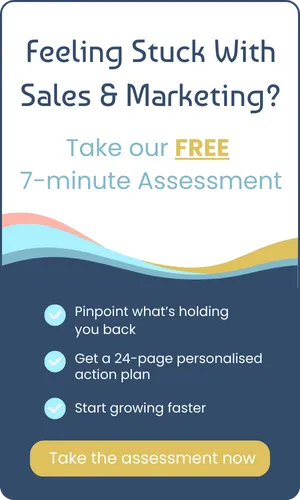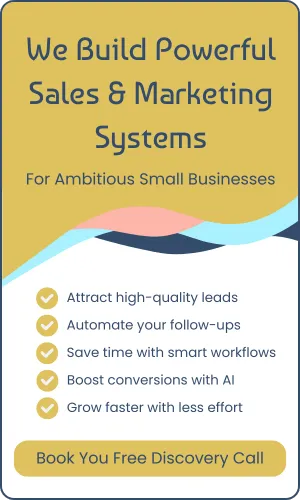SEO Basics for Small Business Websites | Get Found on Google
You’ve got a great product or service ☑️
You've invested in a lovely website ☑️
But, if no one can find you on Google, you're missing out on growth opportunities.
That’s where SEO comes in. It might sound technical and overwhelming, but basic SEO for your small business is simpler than you might think… and absolutely worth the effort.
This guide covers the essentials you need to start improving your visibility and attracting more website visitors (without hiring an SEO agency).
And, we share two great tools that we use ourselves to help make the game of getting found on Google so much easier.
Let's dive in...
What Is SEO, Exactly?
SEO (Search Engine Optimisation) is the process of improving your website so that it shows up higher in search engine results, especially on Google.
Good SEO = more visibility = more potential leads and customers.
Why SEO Matters for Small Businesses
It’s cost-effective – Unlike paid ads, SEO traffic is free
It builds trust – People trust organic search results more than ads
It compounds over time – The earlier you start, the better your long-term results
Even basic improvements can help you start climbing the rankings.
5 SEO Basics You Shouldn’t Ignore
1. Use Relevant Keywords
Think about what your ideal customer types into Google.
Example: Instead of “great dog trainer”, they are more likely searching for “puppy training in Manchester”.
Use those search phrases:
In your Page Title
In your main Heading and in a couple of other Sub-Headings
Throughout the Body Text of your page (but don't over do it!)
Behind an Image as the 'alt text'
The important thing here is not to overdo it. Your page copy must be written naturally, but intentionally. The goal is to strike a balance between pleasing Google, and your human visitor!
GREAT TOOL No.1 - UberSuggest
UberSuggest allows you to get keyword insights into the strategies that are working for others in your market so you can adopt them, improve them, and gain an edge.
2. Create Helpful, Local Content
Answer common questions your customers have.
Blogs, like this one, are great ways to add pages to your website that are optimised for SEO, whilst also adding value to the visitor.
Blog with content along the following lines:
“How to choose the right [your product/service]”
“Top 5 mistakes when [problem your service solves]”
“Best places for [relevant local search] in [your town]”
A good content strategy is central to your overall marketing strategy, and when done right can be simple and highly effective.
GREAT TOOL No.2 - Answer The Public
Answer The Public listens into search requests from search engines like Google then quickly cranks out every useful phrase and question people are asking around your keyword. This makes it super easy for you to create highly targeted content.
3. Optimise Page Titles and Descriptions
Each page on your website should have a unique title, description and an image. These are the elements that show up in Google results, or when you share a website link on social channels.
In the world of website design and SEO these are called your Meta Title, Meta Description and Meta Image. (Nothing to do with Meta Inc, they were called this way before Facebook became Meta!)
Best practice is the keep them short, clear, and include your keyword for that page.
Here’s the one we’ve used for this post so you can see how we’ve placed the keyword in the page title and description.
Meta Title:
SEO Basics for Small Business Websites | Get Found on Google
Meta Description:
Want your business to get found on Google? Learn the SEO basics every small business website should follow, and discover how to improve your rankings without being technical.
Can you see what we've done there?
4. Improve Website Speed and Mobile Experience
Google cares about the user experience. There's no shortcut around this, your website must load quickly and operate smoothly on all device types.
We've written several other articles that will help you analyse your sites speed and operational performance on difference devices for FREE!
When you've finished this article we highly recommend popping over and reading these too.
You can access your own FREE website speed report and learn more on the following articles.
1, Why Website Speed Matters For Small Business Growth
2, Mobile Friendly Website: Reaching Customers On The Go
3, Six Quick Fixes To Instantly Improve Your Website User Experience
5. Relevant Internal Content Links
These are links from pages on your website, to other pages on your site that the users will find relevant and useful.
Google uses these links to understand which other pages it should be reading (or crawling in Google terminology!).
This linking structure ensures that when Google's located one page, it knows to look at other pages too. In turn, this helps it discover more great content around your site. More pages, more relevant content, more links... and so it goes on!
In the world of Google SEO this is called "Indexing" your site. The goal is to ensure that Google knows about all the pages on your website so it can present them search result answers.
5. Get Backlinks
These are links from other websites pointing back to your website.
Why?
Well, the strategy is similar to to point 5 above. Except rather than telling Google to look internally to a site, these links point to other relevant sites externally.
When Google then visits (crawls) these pages, it then knows to go and look at these external website pages too.
You can very quickly and easily build backlinks to you site. You probably have some already without even realising it!
Listings on Directory sites, Guest Blogs and Testimonials on other sites should all have links back to relevant pages on your website.
Backlinks shouldn't always be to your homepage. Take a moment to think about whether a blog article, lead magnet landing page, or an offer page will be of more use to someone (or Google) visiting your website from this link. The golden rule is to make sure backlinks are as relevant and helpful in the visitors journey as possible.
Recap: Start With These SEO Basics
You don’t need to become an SEO expert overnight, but implementing these changes around your website, funnels and landing pages will make a big difference.
Here’s a quick summary of what to focus on first:
Use keywords your ideal customers are actually searching for. UberSuggest will give you these keywords.
Create helpful, local content that answers real questions. AnswerThePublic will help you discover the questions your buyers are asking.
Optimise your page titles, descriptions, and images.
Make sure your site loads quickly and looks great on mobile. Read the articles linked above for step-by-step guides to do this.
Use smart internal links and build backlinks from other websites
SEO isn’t a one-off job, it’s an ongoing strategy that compounds over time, and helps your ideal customers find you at the exact moment they’re looking.
Let's get your website working as hard as you do!
How Samai Can Help
With Samai, you don’t need 12 different tools or a full-time marketing team to make SEO part of your growth plan.
Our all-in-one platform gives you everything you need to:
Build fast, SEO-friendly websites and landing pages
Create and publish blog content with built-in guidance
Track visitor behaviour and performance in one simple dashboard
Automate lead capture and follow-up so you make the most of every visit
Get expert support whenever you need help or ideas
And if you’re not sure where to start, our team is here to help you figure out the right plan for your business so SEO becomes simple, sustainable, and actually gets done.
Curious what that could look like for your business?




